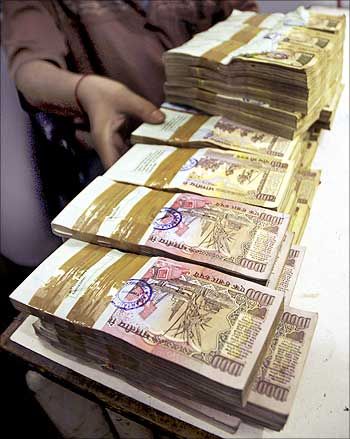 The Reserve Bank is likely to keep the key interest rate unchanged in its October 30 monetary policy because of inflationary pressures, but might go for another cut in CRR, says an HSBC report.
The Reserve Bank is likely to keep the key interest rate unchanged in its October 30 monetary policy because of inflationary pressures, but might go for another cut in CRR, says an HSBC report.The RBI has held its short-term lending (repo) rates unchanged at eight per cent since April 2012. In its policy review on September 17, RBI reduced the cash reserve ratio - the percentage of deposits banks keep with central bank - by 0.25 per cent to 4.5 per cent.
It will come out with the next monetary policy review on October 30, amid industry demands for a rate cut to boost economic growth.
"Given the slightly better domestic activity readings and lingering upside risks to inflation, the RBI is expected to keep the policy rate on hold on 30 October, although another CRR cut is possible," HSBC said.
The RBI is likely to keep the policy rate unchanged, as since the last monetary policy meeting, the global backdrop remains broadly the same.
Moreover, during this period domestic activity has picked up, inflation is on the rise again, but no additional key structural policy measures have been implemented.
In this scenario, "the RBI is likely to keep the policy rate unchanged, although they may cut the CRR again and step up open-market operations to address the recent widening
Regarding the recent reforms thrust by the government, HSBC said that while the announced measures are necessary to create the room for rate cuts, "we do not see them as sufficient by themselves to trigger a cut".
Moreover, they were already known at the time of the last monetary policy meeting when the RBI kept the policy rate unchanged, the report added.
The government has recently taken a number of reform initiatives like allowing FDI in multi-brand retail, aviation and broadcasting, besides hiking diesel prices, capping the number of subsidised LPG cylinders.
The government has unleashed a second wave of reforms deciding to open the pension sector to foreign investment and raising the FDI cap in insurance to 49 per cent.
Looking ahead, rate cuts would depend on the extent to which inflation risks begin to recede, HSBC said. A rate cut in December is still in the cards, but it could get pushed back until early next year if inflation proves more stubborn than expected and additional fiscal and structural reform measures are not forthcoming, as per the HSBC report.
India is facing a challenging situation, where growth rate has slowed down significantly, yet inflation levels remain high. Inflation rose to 10-month high of 7.81 per cent in September as prices of wheat, cereals and fuel and power soared.











 © 2025
© 2025